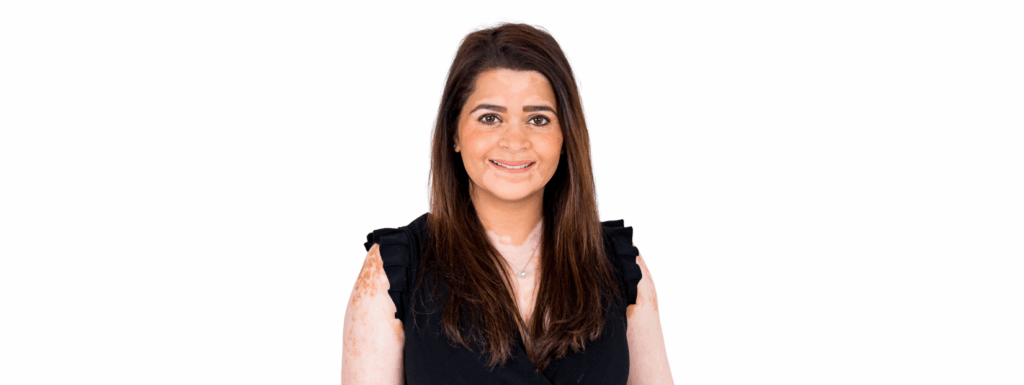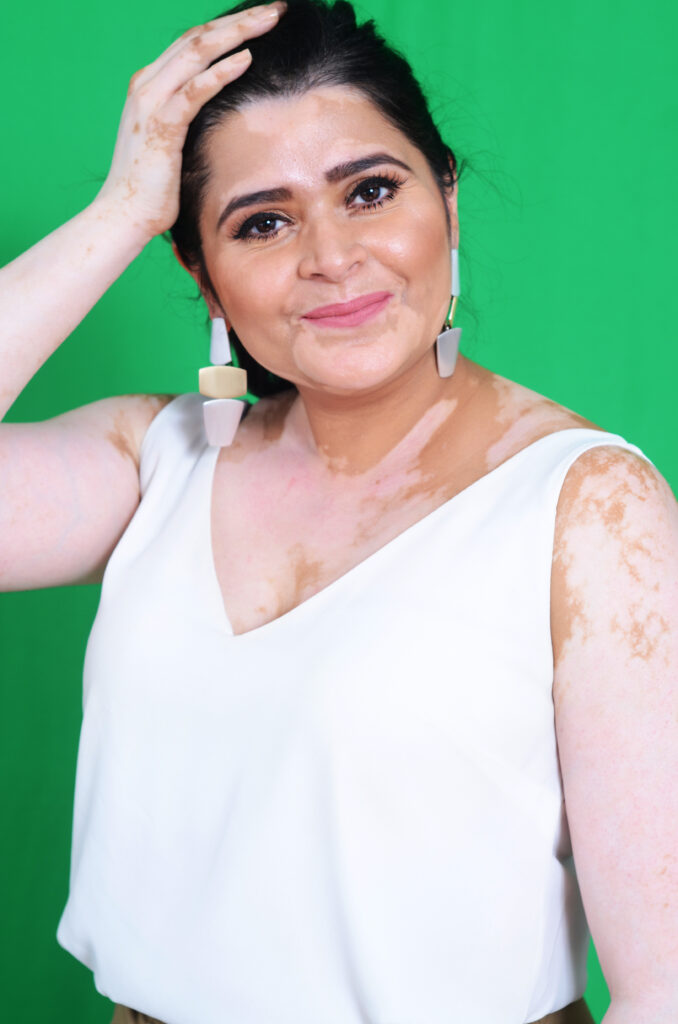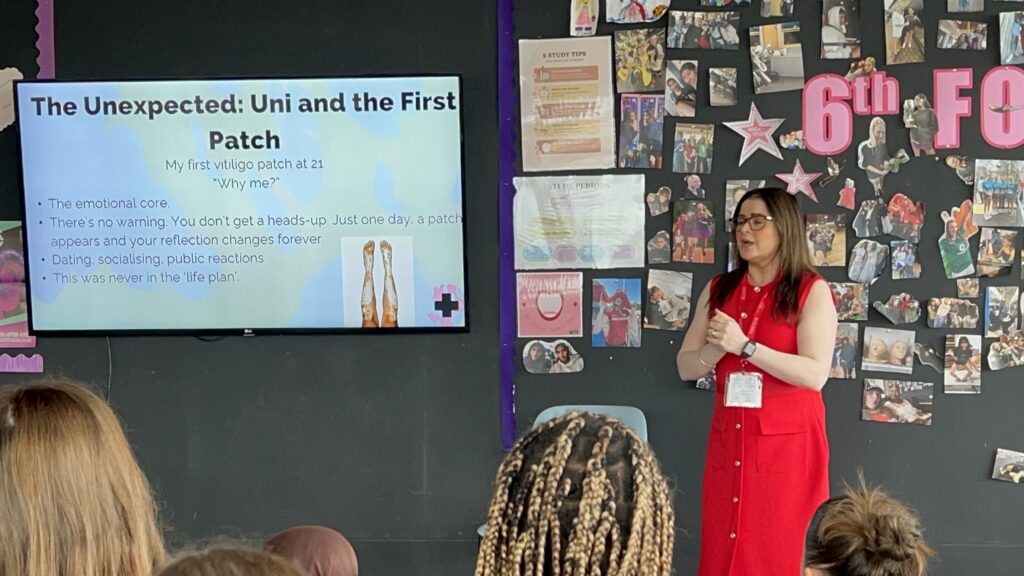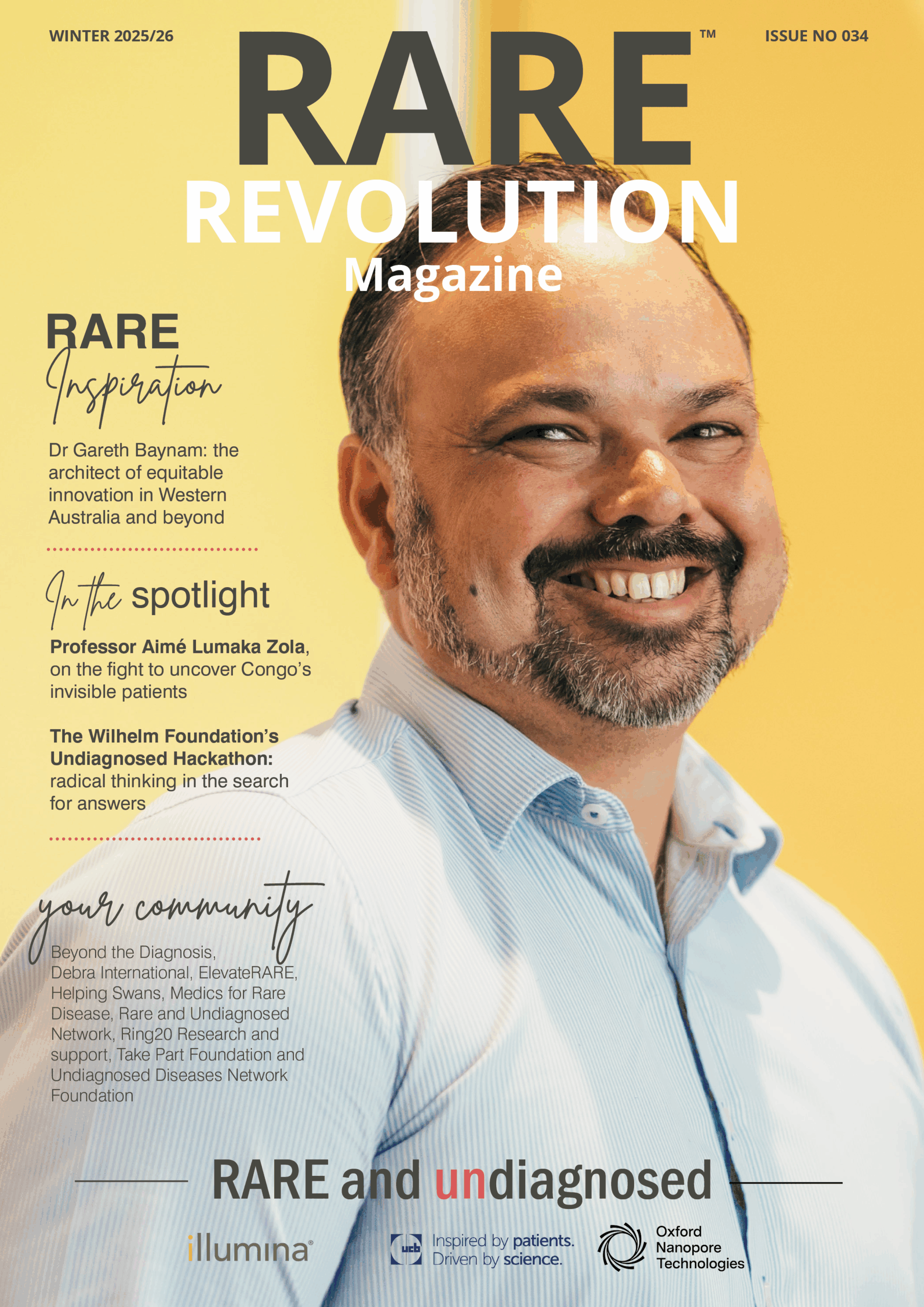Vitiligo: my changing sense of self
Joti Gata-Aura lives with the rare skin condition, vitiligo. Having learned over time how to feel comfortable in her own skin, Joti now advocates for people with vitiligo and other visible differences. As a woman of Indian heritage, she has had to learn to accept that her skin is always changing. Here she reflects on how her lived experiences have affected her own sense of self and cultural identity

Written by Joe Rumney, RARE Revolution
Interview with Joti Gata-Aura
More than skin deep
Joti Gata-Aura has navigated vitiligo since her diagnosis over 20 years ago. In that time, while also being a dedicated parent and teacher, she has embraced the role of educator and campaigner for people with visible differences, which she does through her personal advocacy and through her work with the charities Changing Faces and The Vitiligo Society.
Vitiligo is a rare long-term skin condition characterised by the loss of pigment, resulting in white patches which appear anywhere on the body. This occurs when the cells responsible for producing melanin—the pigment that gives skin its colour—are destroyed or stop functioning.1
While now a confident advocate, Joti hasn’t always felt strong in her own skin. In the early stages of her vitiligo journey, aged just 21 years old, she struggled with increasing depression and anxiety as her skin started to change, particularly on her face. There were periods when she couldn’t even open the door to visitors who called at her house— feeling compelled to hide her skin from the outside world. She would often think of excuses to avoid contact with other people, “Those initial few years were really hard. I think people look at me now and forget the hard times I’ve gone through”, Joti explains.
As she started her teaching career, Joti would experiment with different makeup products to disguise the patches, which were becoming increasingly apparent. “When I started teaching, I was covering up my skin from top to bottom. It’s actually quite embarrassing now, but I didn’t know how to deal with it then.” She also spent considerable time finding ways of making her skin tone appear more uniform. “I was having to use different brands of makeup. I was spending a lot of money,” she continued.
“I still wasn’t at the point of acceptance. I was still very patchy in appearance and I was very nervous about what people thought about me.”
As her skin continued to lighten, Joti would even receive unwanted comments from others in her community, including her own family, “They’d make a joke about it and say things like, “We’ll have to rename you now” (making reference to her lighten skin which stood her apart from her Indian family). I’d laugh along, but it kind of bugged me.” At school, her pupils would enquire, “Where are you from, Miss?”. When Joti moved schools, she was even approached by another teacher, who said, “I didn’t think you were British Indian, I thought you were Italian or European”. As a young adult, these reoccurring comments started to have a lasting effect. And in 2021, Joti published her autobiography, Strong In the Skin I’m In, recounting these day-to-day life struggles of living with vitiligo. The process of writing and sharing her experiences was deeply cathartic for Joti.
Cultural identity

www.pcistudio.co.uk
Over the years, Joti has faced new challenges particularly with the birth of her children. With an Indian husband and children, she feels this disconnect between her physical appearance and theirs, which, of course affects her broader sense of cultural identity too. As someone who is deeply rooted in her culture, Joti has noticed people reacting differently to her. “When we’re out and about, people do look at us twice because now I’m whiter. My kids just don’t look like me in that way that signifies a shared heritage. That makes me sad because I’m really proud of my identity.”
“I’m proud of who I am. And that’s almost been stripped away from me.”
Since her skin tone has become almost uniformly white, Joti has also noticed a shift in how people view her appearance in countries where skin whitening is celebrated. Recently, while on holiday in Thailand, she couldn’t believe the sheer number of different whitening products on supermarket shelves. In fact, the Asia-Pacific region has the largest share of the global market for skin-whitening products, at 53.69% as of 2023. 2
Joti recalls one occasion in Thailand when a local woman started touching her and repeatedly asking what skin-whitening product she had used, looking for a recommendation. “Of course, it was completely innocent—she couldn’t communicate in English very well, so she didn’t know it was due to a condition and not skin bleaching”, but that impacted Joti non-the-less.
These experiences have made Joti reflect on her condition and its impact on how she is perceived by those around her. “Now that I’ve lost my natural skin tone and colour, I don’t really get identified as Indian and that’s really tough for me to accept.” This disconnect means that Joti falls between her two cultures without the strong visual anchor to either and it is an ongoing process to reconcile her feelings around this.
Now, through her tireless campaigning with Changing Faces and The Vitiligo Society, Joti continues to reassure and support the people who need it most. Her experiences bring an important perspective often ignored in vitiligo—the role our skin plays in our relationship with our personal identity and heritage.
With each passing year, as her skin continues to change, Joti has grown from a place of vulnerability—feeling the need to mask her skin or even hide away completely—to one of self-acceptance and new found comfort in her skin. “I’ve still got these patches. Yesterday, I woke up and I was so exhausted, so I thought, “Should I go into school like this?” So I did—I just put a bit of powder on and went into work. That would have been a big thing before. I’ve come a long way.”
“Be seen. Be heard. Be you.”

Learn more about Joti’s work with Changing Faces in our RARE and social edition, which you can read at https://bit.ly/RAREandSocial-ChangingPerceptions. You can also visit Joti’s website at positivelydiverse.co.uk.
Read our review of Joti’s memoir, Strong in the skin I’m in, HERE

References
[1] nhs.uk/conditions/vitiligo


